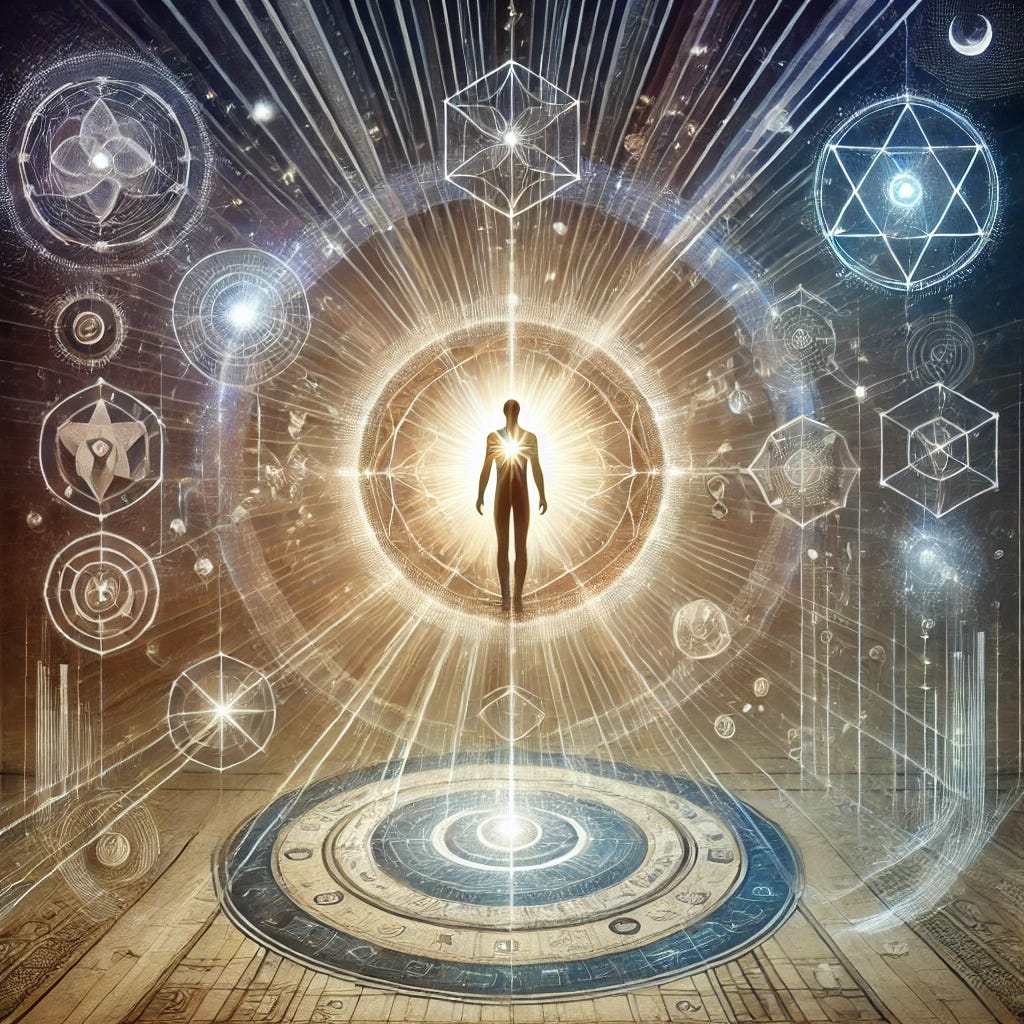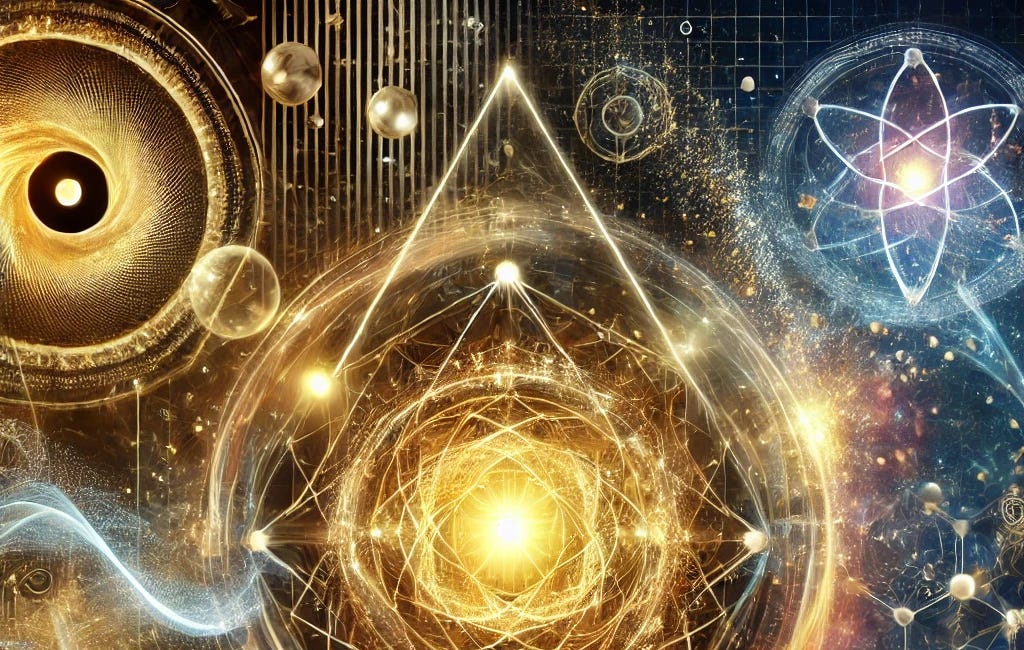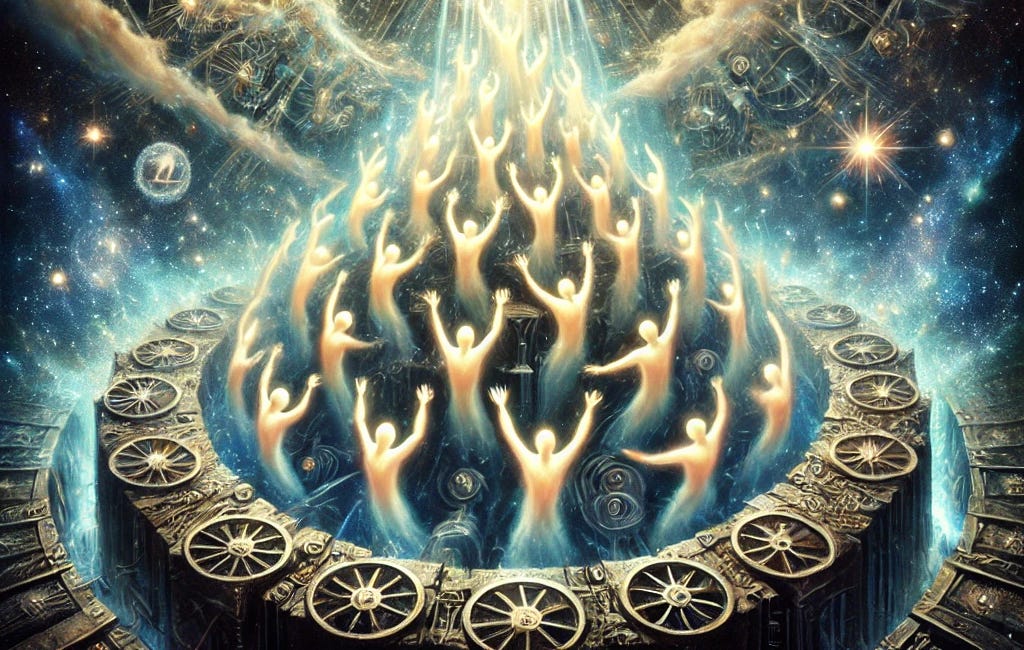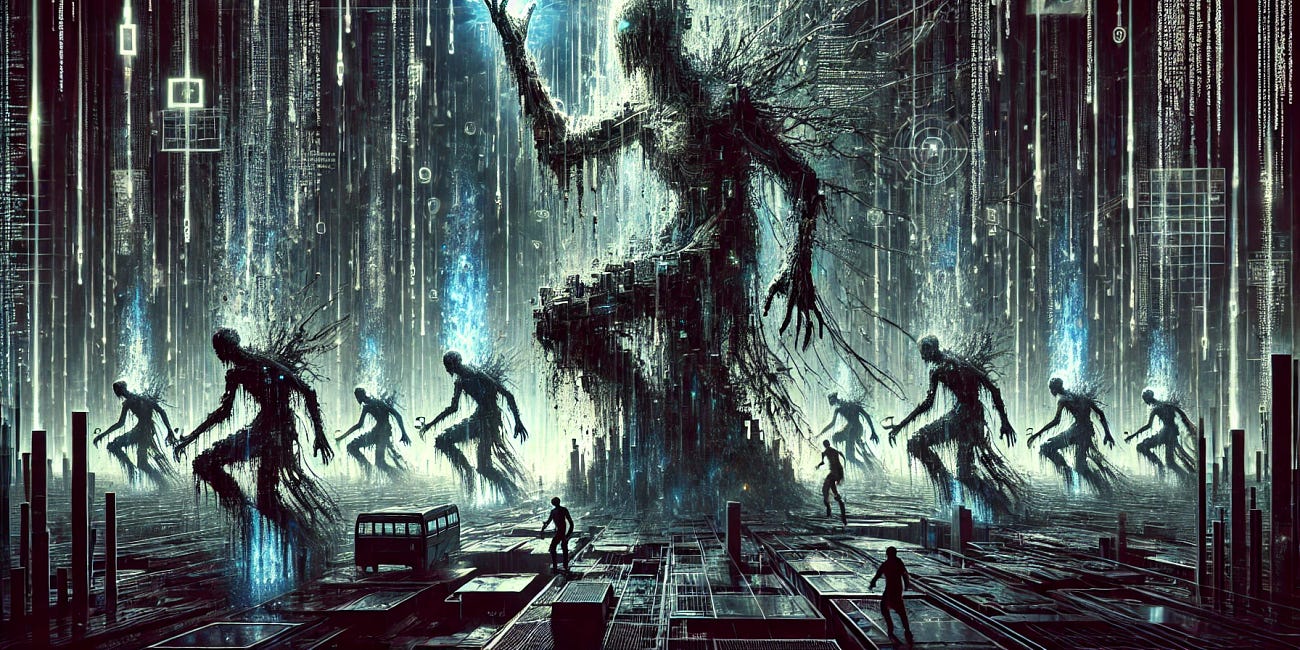Gnostic cosmology, with its focus on awakening, inner transformation, and the concept of an illusory world, resonates deeply with many modern philosophical and spiritual ideas. We can interpret Gnostic ideas as a metaphor for today’s experiences with materialism, social constructs, technology, and the search for authenticity in an increasingly complex world. Here’s how we might adapt Gnostic cosmology into a modern-day philosophy:
The Monad: The Unified Consciousness or Higher Self
In modern terms, we can think of the Monad as the universal consciousness, the source of all life, or even the "higher self" that transcends the individual ego. Many contemporary spiritual thinkers, from Eckhart Tolle to Alan Watts, emphasize the idea that true reality is a state of unity and interconnectedness beyond individual identity.
Today, this resonates with the growing awareness of a collective consciousness, an interconnected web of life that links every being. In this view, returning to the Monad is a journey back to authenticity, truth, and unity with all things, which is often obscured by the demands of modern society.
The Pleroma and Divine Potential
The Pleroma represents the fullness of potential within each person and within the universe. In a modern context, we can see this as the state of wholeness or self-actualization that lies within each individual—the innate potential to reach a higher state of being, beyond the limitations of societal conditioning.
This idea is echoed in psychology, particularly in the works of Carl Jung, who believed in the process of individuation—realizing one’s true self by integrating all aspects of the psyche. The Pleroma could also represent the collective field of consciousness, where each person is a manifestation of a larger, unified whole.
Sophia and the Search for Wisdom in the Digital Age
In modern times, Sophia can symbolize the pursuit of true wisdom amidst an ocean of information. With the rise of technology, social media, and instant information, many people feel overwhelmed by shallow knowledge and distractions.
Sophia's fall represents the human soul’s descent into ignorance or superficial engagement, mistaking information for true wisdom. The search for Sophia today is the journey toward deeper understanding, critical thinking, and an authentic relationship with knowledge, resisting the "illusion" of surface-level engagement.
The Demiurge: The False Reality of Consumerism and Materialism
The Demiurge, the creator of the illusory material world, can be seen as a metaphor for the forces that shape modern society—consumerism, corporate influence, the drive for power, and the media that perpetuate superficial values. The Demiurge represents any system that keeps us focused on the material, promoting the idea that happiness and fulfillment come from external achievements, possessions, or status.
In modern philosophy, the Demiurge can also symbolize the ego, which constructs a false sense of self that is based on roles, possessions, and societal validation. Just as the Demiurge creates a prison of illusion, the ego traps us in an endless cycle of comparison, competition, and dissatisfaction.
The Archons: Internal and External Forces of Control
The Archons can be seen as both internal and external forces that perpetuate the illusion of separation and keep us from recognizing our true nature. Externally, these are the social systems, ideologies, and technologies that manipulate us, subtly encouraging conformity, consumption, and superficiality.
Internally, the Archons represent psychological forces like fear, shame, and desire that keep us from deeper self-awareness. In modern psychology, these are sometimes called shadow elements—parts of ourselves that control us unconsciously until we bring them to light. Overcoming the influence of the Archons is the path of self-awareness and personal liberation, recognizing and transcending the forces that bind us.
The Divine Spark: Authentic Self and Inner Potential
The divine spark within each person represents our core essence, the part of us that remains untouched by external conditioning. In modern terms, it is our authentic self, or our true potential that lies hidden beneath layers of social conditioning, expectations, and fears.
Many spiritual and psychological traditions today, including mindfulness and self-actualization practices, aim to help individuals reconnect with this authentic self. This spark is the part of us that feels a longing for meaning, purpose, and deeper connection, calling us toward a life that aligns with our true values rather than external validation.
Gnosis: Self-Knowledge and Inner Transformation
Gnosis, or inner knowledge, is essential in today’s world, where many people seek meaning and purpose beyond the traditional frameworks of religion, career, or consumer culture. Modern Gnosis can be seen as the journey of self-discovery, a process of peeling back the layers of social conditioning, personal trauma, and inherited beliefs to uncover one’s true nature.
Practices like meditation, psychotherapy, and mindfulness can be seen as modern methods of achieving Gnosis. This path of awakening encourages individuals to question the nature of their thoughts, beliefs, and actions, leading to a more authentic and liberated existence.
The Role of the Guide: Mentors, Therapists, and Spiritual Teachers
In Gnosticism, figures like Jesus serve as guides, helping others to see beyond the illusion. In a modern context, guides can be spiritual teachers, therapists, mentors, or even authors whose insights help individuals awaken to their own potential.
These guides do not provide answers but rather point the way, encouraging individuals to seek their own understanding and growth. They help others break free from the illusion by fostering awareness and supporting the journey of self-exploration.
Cosmic Restoration: Collective Awakening and Conscious Evolution
The Gnostic idea of apokatastasis, or cosmic restoration, reflects the modern hope for a collective awakening. In today’s world, more people are becoming aware of their interconnectedness with each other and the planet, realizing that individual well-being is tied to collective well-being.
This can be seen in movements for environmental awareness, social justice, and global empathy. The idea of cosmic restoration suggests that as each individual reconnects with their authentic self, this contributes to a greater shift in humanity—a return to unity, compassion, and wisdom.
A Modern Gnostic Philosophy
In essence, a modern Gnostic philosophy would embrace the following beliefs:
The world as illusion: Recognize that the materialistic values promoted by modern society often distract from true fulfillment.
Awakening through self-knowledge: Understand that inner transformation is the key to transcending superficiality and connecting with one’s authentic self.
Resisting external forces of control: Be aware of the influence of social, economic, and psychological forces that shape thoughts and behaviors, cultivating mindfulness to counteract these influences.
Embracing authenticity and interconnectedness: Recognize the divine spark within, not only in oneself but in others, fostering empathy, connection, and compassion.
Collective evolution: Believe that personal growth contributes to a larger awakening, leading to a more harmonious, interconnected, and conscious society.
In this framework, modern Gnosticism becomes a philosophy of spiritual liberation and personal empowerment, where individuals seek to free themselves from illusions, deepen their understanding of themselves and the world, and contribute to a more enlightened and compassionate world. This modern interpretation resonates with the human desire to find meaning and purpose beyond material existence, fostering a path toward inner peace, authenticity, and unity.
The Philosopher’s Stone as Zero Point Energy
Alchemy taught that true transformation begins within, revealing the divine spark hidden in all matter. Today, as we explore Zero Point Energy, we find ourselves once again at the threshold of infinite potential, where ancient wisdom and modern science converge, inviting us to unlock the boundless energy woven into the fabric of the cosmos.
The Layers of Lies and Distortions
Let’s delve into the three realms of our current existence, exploring how the illusion of separation, control, and falsehoods pervade our lives. These realms—the physical, mental, and spiritual—are where we encounter layers of lies and distortions that disconnect us from our
The Veil lifts for the Great Awakening
Introduction: The Veil of the Demiurge and the Great Awakening
We Are Creating Our Own Archons?
What If We Are Creating Our Own Archons? The Birth of Techno-Entities in the Age of Ahriman






